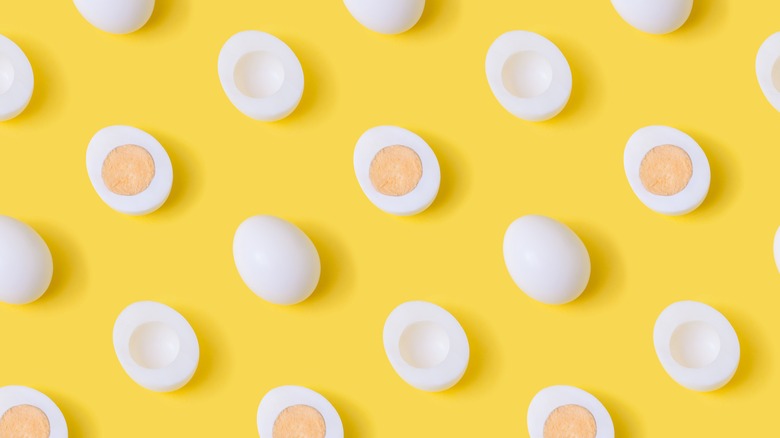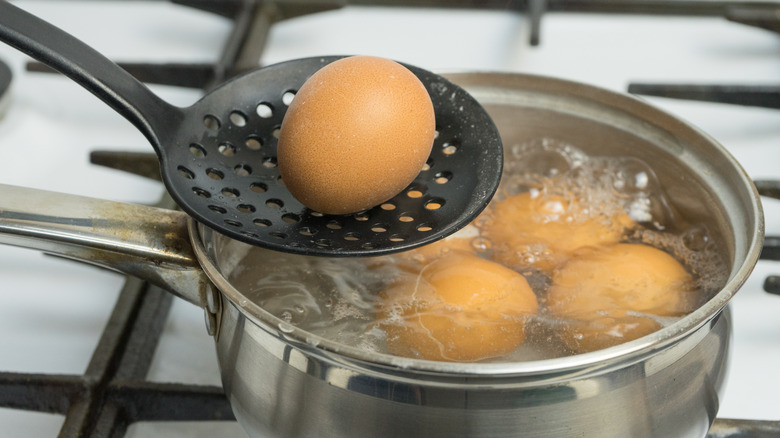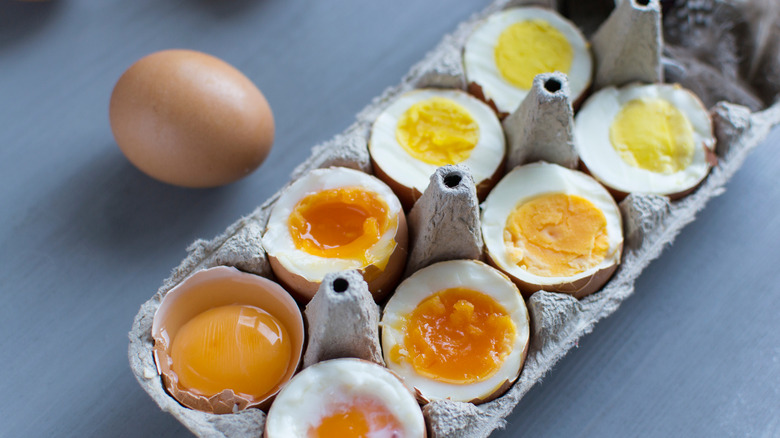The Foolproof Way To Ensure Hard-Boiled Eggs Are Perfectly Cooked
Ask a roomful of cooks — or, say, the entire internet — how to tell if your hard-boiled eggs are done to your liking, and you'll get at least half a dozen answers.See if you can shine a flashlight through the egg. Shake it like a maraca and listen for the telltale swish of uncooked yolk. Spin it on a countertop and see if it wobbles. Still not sure? Put the egg in a glass of water and look for air bubbles escaping. Heck, crack the thing and see if the yolk oozes out.
These hacks work! Well, they work if all you want to know is if your egg is raw or cooked. A raw egg does indeed let a little light through, makes a tiny noise when shaken, wobbles when you try to spin it, and releases air bubbles from inside the shell. But none of these methods can tell you just how cooked your hard-boiled egg actually is, and that's not acceptable. Egg fails are distressing.
There is a foolproof way to tell whether you'll find a jammy center or a perfect crumbly yolk when you peel that egg, and it's a facepalm of an answer: Use an egg timer. Yes, the thing with 'egg' and 'timer' in its actual name.
Timing is everything
Timing your eggs matters because it takes time for the yolk to reach optimal temperature, which is between 158 and 170 degrees Fahrenheit, according to Serious Eats. You could use an instant-read thermometer jammed right through the shell to figure this out, but it's far easier to simply learn how long this actually takes on your stovetop.
You could use an adorable egg timer shaped like an egg, or you could rough it like Jacques Pépin does and grab a good old-fashioned clock to execute his 10-minute technique, as seen in this video from the Jacques Pépin Foundation. To do as he does: poke a tiny hole in the fatter end of your raw eggs with a pin to release the air pressure inside for easy peeling later, then lower them into a saucepan of just enough "barely boiling" water to cover the eggs. Cook for 10 minutes, drain the water, shake the pan to crack the shells just a bit, then plunge the eggs into an ice water bath to stop the cooking process. Peel with care under running water. And that's it!
Your time may be different depending on the heat of your burner, the size of your eggs, and even the altitude at which you're cooking. Use Pépin's 10-minute rule as a starting point, but you might want to do a few trial runs to find the time that works best in your kitchen. It likely falls somewhere between 9 and 12 minutes.
Eggs fit for a king
Finally, if you've got to nail it with no margin for error, consider the approach allegedly adopted by King Charles' private chef. To accommodate the royal's picky egg preferences, the chef would hard-boil seven eggs — and remove each from the pot at one-minute intervals — to get just a single satisfactory hard-boiled egg.
In his book "On Royalty," U.K. TV host and author Jeremy Paxman wrote, "Because his staff were never quite sure whether the egg would be precisely to the satisfactory hardness, a series of eggs was cooked, and laid out in an ascending row of numbers." One of those eggs, it was hoped, would be to the then-prince's liking. According to Paxman, "If the prince felt that number five was too runny, he could knock the top off number six or seven."
No word on what happened to the rejects. Perhaps this creamy egg salad, which accommodates both medium and hard-boiled eggs, might be worth sending to Buckingham Palace. If you're not quite as picky as King Charles or looking to toss out six eggs for everyone that's to your desired doneness, stick to the egg timer.


